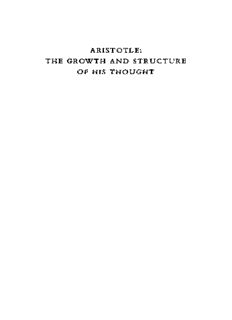
Aristotle: The Growth and Structure of his Thought PDF
Preview Aristotle: The Growth and Structure of his Thought
ARISTOTLE: THE GROWTH AND STRUCTURE OF HIS THOUGHT ARISTOTLE: THE GROWTH AND STRUCTURE OF HIS THOUGHT BY G.E.R.LLOYD Professor of Ancient Philosophy and Science, and Master of Darwin College, Cambridge CAMBRIDGE UNIVERSITY PRESS PUBLISHED BY THE PRESS SYNDICATE OF THE UNIVERSITY OP CAMBRIDGE The Pitt Building, Trumpington Street, Cambridge, United Kingdom CAMBRIDGE UNIVERSITY PRESS The Edinburgh Building, Cambridge CB2 2RU, UK http://www.cup.cam.ac.uk 40 West 20th Street, New York, NY IOOII-42II,USA http://www.cup.org 10 Stamford Road, Oakleigh, Melbourne 3166, Australia Ruiz de Alarcon 13, 28014 Madrid, Spain © Cambridge University Press 1968 This book is in copyright. Subject to statutory exception and to the provisions of relevant collective licensing agreements, no reproduction of any part may take place without the written permission of Cambridge University Press. First published 1968 Reprinted 1973, 1977, 1980, 1982, 1988, 1990, 1993, 1999 (twice) Printed in the United Kingdom at the University Press, Cambridge Library of Congress catalogue card number: 68-21195 ISBN o 521 07049 x hardback ISBN o 521 09456 9 paperback To JOHN RAVEN CONTENTS Preface pageix Abbreviations xiii PART I INTELLECTUAL DEVELOPMBN1 i Life and writings 3 2 The pupil of Plato 19 3 The critic of Plato 42 4 The philosopher of nature 68 5 The founder of systematic research 94 PART II FUNDAMENTALS OF ARISTOTLE'S THOUGHT 6 Logic and metaphysics in 7 The physics of the heavenly region 133 8 The physics of the sublunary region 159 9 Psychology 181 io Ethics 202 II Politics 246 12 Literary criticism 272 13 Conclusion 283 Suggestions for farther reading 3i6 Glossary of Greek terms 3i8 Index of passages referred to 319 General Index 321 PREFACE This book is intended to help the student to discover and explore Aristotle. Most people would agree that he is not an easy philosopher to approach. His treatises cannot be read for enjoyment purely as literature, as many of Plato's dialogues can, and the man behind the treatises has the reputation of being a dry, uninspiring, even rather inhuman, person. If in the popular view Plato is as much a poet as a philosopher, Aristotle is still generally thought of first and foremost as a dogmatist and systema- tiser. This account of him, which is largely the product of a tendency to confuse Aristotle with Aristotelianism, is grossly exaggerated. Like Plato, he conceived the business of philosophy to consist as much in the defining of prob- lems, the examining of alternative views, and the explor- ing of difficulties, as in the propounding of solutions, and his thought, like Plato's again, underwent a gradual evo- lution, even though this is, in his case, much more difficult to reconstruct owing to the nature of our evidence. But while Aristotle is neither as unimaginative nor as inflexible as he is sometimes represented, no one can deny that his thought is often opaque. The treatises make slow and difficult reading, although their difficulty arises as much from the complexity and subtlety of their ideas as from the obscurity of Aristotle's expression. Yet however daunting the texts appear, there is no substitute for a close study of Aristotle's own words to grasp his philosophy. The commentator's role is merely to mediate between Aristotle and his twentieth-century reader. Certainly IX PREFACB nothing is to be gained from attempting to give him a spurious air of modernity, or from exaggerating the extent to which his ideas are relevant to current philo- sophical issues. To understand Aristotle one must place his philosophy in the context of the problems and* con- troversies that interested him. But that is not to say that he is to be treated as a figure of purely antiquarian interest or that his thought is to be judged without regard to any philosophical or scientific idea that has been put forward since the fourth century B.C. On die contrary, to appre- ciate the originality and importance of his work it is essential to bear in mind subsequent developments in each of die fields that he investigated, and these include not only the various branches of philosophy and natural science but also what we should call sociology and even literary criticism. The aim of die first part of diis book is to tell the story of Aristode's intellectual development in so far as it can be reconstructed, and of the second to present die fundamen- tals of his thought in die main fields of inquiry in which he was interested. The book is addressed to die beginner and die amateur, not to die experienced Aristotelian scholar. It is intended for the undergraduate who has reached a stage in his classical or philosophical studies when he can defer no longer die task of coming to grips widi Aristotle, and for any reader who is interested enough in some aspect of Aristotle's work or influence to want to learn a little more about the philosopher and his diought. I have dealt only with essentials, but die reader should be warned diat these involve some serious problems which
Description: